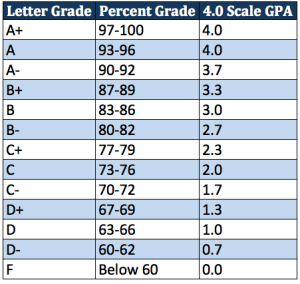I knew this guy who could not sleep in the beginning of college until he felt 100% prepared for his exams, papers, and projects. On a couple of occasions he would go down the hall to finally go to bed at 5 am and say hi to a guy in ROTC who was starting the day.
His roommate, friends, and professors asked what drove this guy. Were his parents crazy? Did they expect the world out of him?
He answered no to those questions. Because going to a top law school and working in Biglaw drove him. And since one of the key factors to law school admissions is grade point average, he became determined to achieve a 4.0 GPA each semester.
Guess who that guy is? That guy is me. I literally obsessed over my college GPA from my freshman to junior year at Miami University (Rise up RedHawks!).
Did I waste my time pursuing academic excellence? Would my time have been better spent elsewhere?
Let’s take a look at the importance of GPA in the real world to answer those questions. I’ll bet how you view your grades will change after reading this article.
Where Does Your GPA Matter The Most?
For one, grad schools give a lot of weight to an applicant’s GPA (and admissions test score).
Although they say they take a holistic approach to evaluating candidates, many times this is a cover up. They don’t admit it, but they often accept and reject students based on their grades in context with their coursework. So having a decent GPA (at least 3.0) is necessary if you’re going to grad school.
And if you’re interested in going to a top law school, med school, or grad school, then you’re going to want a 3.75 GPA or higher to give yourself a good shot of getting accepted and receiving merit scholarships.
The second area where GPA matters heavily is big companies who specialize in consulting, accounting, engineering, and investment banking. These firms routinely use a GPA cutoff to narrow down the applicant pool.
Simply put, if your grades aren’t up to par (around 3.5) at these firms then you’re not getting an interview unless you have some amazing work experience or leadership position.
So for those going to grad school (use these grad school application tips) or aspiring to work at a big company mentioned above, then you need to do the work required for a high GPA.
But in ALL the other career fields (excluding grad school and big business) you’ll be wasting your time making grades your top priority. The reasons below explain why.
5 Reasons Why Your College GPA Is Secondary
1. Work experience trumps everything
Getting good grades shows that you know how to study in college and take tests. But working for an organization in the real world isn’t as simple and individualistic as studying and regurgitating the info for the exam.
Working with coworkers, managers, and clients gets messy. And those with work experience perform better than those who don’t.
The skills and experiences gained in an internship, semester job, or doing research with a professor sends a clear message of what you’ve handled in the past and also forecasts your ability to do well in the future.
So prioritize getting impressive, relevant internships in your field above GPA and you’ll set yourself up to land your dream job out of school.
Plus, stories from your work experiences are the key to giving good interview answers when you’re in front of the employer.
2. Employers give higher value to other skills
In the post What Skills Do Employers Want?, I explain why organizations love candidates who have leadership, communication, problem-solving, and strategic thinking skills.
So while GPA shows you’re competent, organizations give more value to skills that carry over into the workplace than your performance in a college classroom. If you were the employer, wouldn’t you do the same?
Besides gaining work experience, other areas for you to build these skills are extracurriculars like running for office in a student organization, leading a group project, or starting your own major project.
Basically all experiences that take you out of your comfort zone will help you gain career skills because these experiences force you to grow.
3. Grade inflation
Where students receive higher grades now for the same work they would have received lower grades in the past is called grade inflation. And this is a rising trend across college campuses.
For example, one study found that 43% of all letter grades handed out to students were As. To compare, in 1960 only 15% of college students received an A. And the grade inflation at Harvard College—where the median grade was an A- and the most awarded grade at Harvard was an A—picked up a heavy dose of media attention.
Grade inflation affects the job search because it makes applicants with a high GPA less impressive if many applicants boast good grades. In the past, the minimum GPA threshold would knock out many of their peers from consideration. Now this weed out process cuts out a smaller group of applicants.
Meaning the reward for having a high GPA is devalued. And while having good grades can get you an interview, it won’t get you the job.
4. Too high of a GPA could be seen as a negative
From my personal experience interviewing as a senior in college, I can’t tell you how many times I had to explain to organizations that I didn’t plan to work for a year and then ditch them for grad school.
They would see my 3.9+ GPA and first be impressed. But soon they would ask me, “I see you have a really high GPA. If we hired you, how can we be sure you won’t leave next year for law school or grad school? I’m sure you’ve thought about it.”
(The ironic thing is I advocate this strategy—to work for a year or two and then go to grad school—in this post on how to fund graduate school.)
Now I don’t know how big of a concern this was, but I do know if my grades were more average then this issue wouldn’t have come up during the interview process.
5. GPA is a subjective evaluator
Another reason a good GPA isn’t as impressive as many think is companies struggle to evaluate candidates based on grade point average. There are too many factors involved that influence a cumulative GPA.
A pool of applicants will be spread across different majors, coursework, professors, and schools. So it’s often difficult, if not impossible, to know for sure who had it easier or more difficult than someone else.
For example, sure a 3.6 GPA seems more impressive than a 3.0 GPA. But even then there are different factors involved. If the 3.6 GPA studied political science, and the 3.0 GPA majored in chemistry, maybe the chemistry student did better academically based on the more difficult coursework.
And if the 3.6 GPA student had to study all day to get those grades, while the 3.0 GPA student ran a student org and worked 20 hours a week, who is more impressive now? This ambiguity takes away from a high grade point average.
My College GPA Means Nothing Now
Back to my story: Although I committed myself to getting all As every semester for law school, my senior year I decided to go a different direction and stop pursuing becoming a lawyer.
And literally the second I changed career paths the importance of my grades on my future opportunities tanked.
Now, as an entrepreneur working from home, my college GPA matters as much as what socks I wear when I work (hint: I don’t wear socks when I work).
Although you could say my academic performance boosts my credibility on this site, in the large scheme of things it means nothing in becoming a successful entrepreneur.
So my own experience also supports the idea that grades are overrated in more than a few career paths.
Final Words
I don’t want you to think I’m hating on good grades. Because my intention is not to do this, but to balance the scales back to reality. Having a high GPA is a worthwhile accomplishment, as long as it doesn’t force you to be in the library every day and night.
Because if you’re not working in business or going to grad school, your college GPA matters a whole lot less than most college students think it does. So don’t overemphasize it.
Save yourself the painful all-nighters, the anxiety after you make dumb exam mistakes, and the freak outs when you falsely believe your future is ruined because you got a C- in a class.
Instead, focus on gaining relevant skills and experiences in your field that will show employers you will create value for their organization because you’ve already shown you can do it in the past.
That’s ultimately going to serve you and the organization best.
And these skills and experiences will compound to become more valuable over time, where GPA continues to decline until it means absolutely nothing only a few years into your career.
How important are your grades in your career? How does this insight change what you focus on in college?



